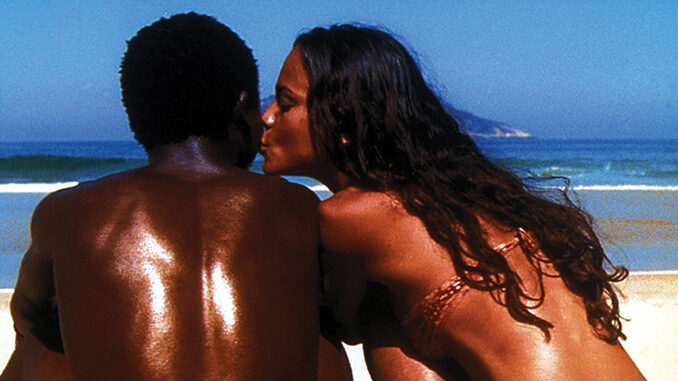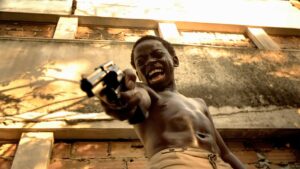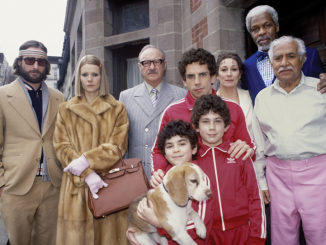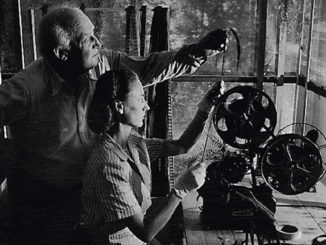
by Oliver Schimmel
I’ve been surrounded by television and film my whole life, so it’s no surprise that I would find myself interested in that medium — to the extent that I would pursue a career in the industry. I’m a born-and-raised Angeleno, so the industry was always in my field of view.
Shortly after graduating film school, I saw the motion picture City of God (Cidade de Deus) in a small art house theatre. I remember thinking to myself, “This is one of the best movies I have ever seen.” Fresh from an extensive academic filmmaking curriculum with a hypersensitive eye to elements that make up this art form, I was struggling to wrap my head around why this film so deeply affected me. Was it the directing? The cinematography? The acting? The writing? These were all excellent but, no; when I really started to look at the film’s structure and design, it was obvious what shined the brightest: the editing!
Working after graduation as a production assistant for the TV show The O.C., I still didn’t know what direction I would take with my career. I just knew I wanted to create visual art. I dabbled in writing, directed a few shorts, entered a few festivals and operated the camera for projects, etc. I thought I’d get a clearer idea of what my focus would be by being around every facet of the process.
This remarkable aspect to the editing inspired me to continue honing that part of my craft.
Becoming an office PA was perfect. When I got the job, I felt like Rocket (the lead character in City of God) when he lands his first gig taking pictures for the local newspaper. Like him, I came from humble beginnings. I grew up in what some would consider the “barrio” — Southern California’s versions of a favela. Unlike Rocket, however, I did not have a clear vision of what I wanted to become. I was lost and unclear.
I studied City of God, watched and watched, realizing that the editing is what really makes the film move at that exciting pace, creating that visceral feeling of being there with the boys. I felt connected to them, like I was a part of the gang, for better or for worse. Again I was reminded of my childhood. I too ran with a pack of kids running wild in the streets at all hours and getting into things we shouldn’t.
I was lucky my life in the barrio ended when I was six, and we relocated to a safer suburban neighborhood. I’m certain that I would not be the successful adult I am today if we hadn’t moved. My life would be quite different; I may not have lived to be age 36 in that neighborhood. I saw a lot of me in Rocket, a big reason I connected with the film.

City of God is not for the faint of heart. It depicts a very violent and grim reality of growing up in the favelas of Brazil. I’ve never felt that it glorifies violence; instead it shows the dark truth and ugly side to violence. I love that about it because I don’t enjoy films that use violence for its own sake, in a cheap attempt to create drama. Daniel Rezende’s editing does a great job revving you up when you need to be, then letting you breathe and relax at the right time. This can be a tricky thing to pull off when dealing with such dark and heavy content.
This remarkable aspect to the editing inspired me to continue honing that part of my craft. It was this discovery of pace and tempo in the cutting pattern that showed me how crucial an edit is when it comes to helping a good — or even great — script become a brilliant work of art. I realized then that as much as I had wanted to direct, I also wanted to edit; it is the true final phase of directing.
For those who value the world of editing, they owe it to themselves to watch this masterpiece, which won the BAFTA Award for Best Editing, and earned an Oscar nomination for the same. It truly absorbs the audience. From the opening sequence, in which we chase a chicken through the streets of Rio De Janeiro, to the big gang fight between Li’l Zé and Knockout Ned, Rezende has us on the edge of our seats with seamless edits and perfect timing. I felt it the first time I saw it. I knew I was watching masterful editing.
Through this cinematic brilliance, the written word, actors’ performances and cinematography were assembled into a beautiful harmony of visual oneness. City of God gave me a focus in my craft for the first time, which moved me to embark on a new career — one that has now become a 10-year editorial adventure.





